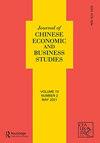Time-frequency nexus between COVID-19, economic policy uncertainty and China’s stock market during the COVID-19 period
IF 3.7
Q2 ECONOMICS
Journal of Chinese Economic and Business Studies
Pub Date : 2023-10-17
DOI:10.1080/14765284.2023.2270846
引用次数: 0
Abstract
ABSTRACTIt is acknowledged that COVID-19 sentiment influences economic policy uncertainty, which is subsequently reflected in stock market investment decisions, resulting in stock price variations. In this scenario, we attempt to explore the influence of COVID-19 and economic policy uncertainty on China’s stock market using wavelet analysis. The findings of novel wavelet frameworks uncover a bi-directional lead-lag association between COVID-19 sentiment, economic policy uncertainty, and stock market returns in China. In addition, the most pronounced degree of causal associations for the concerned couples occurred in the short and medium-run horizons. Specifically, our results unveil that economic uncertainty and COVID-19 sentiment are the main transmitter of shocks, while the stock market is the recipients of shock spillovers. Our research provides policymakers and market participants with critical insights into the behavior of Chinese stock markets during the COVID-19 crisis.KEYWORDS: Economic policy uncertaintyCOVID-19stock marketwavelet analysisChina Disclosure statementNo potential conflict of interest was reported by the author.Additional informationFundingThis research is funded by the University of Finance-Marketing, Ho Chi Minh City, Vietnam.Notes on contributorsNgo Thai HungNgo Thai Hung graduated PhD in Finance at Corvinus University of Budapest, Hungary. Currently, he works as a lecturer in Finance at University of Finance-Marketing, Ho Chi Minh, Vietnam, where he delivers different finance and economic-related courses. His interest research is primarily concentrated on market integration and the non-linear dynamics of financial prices. He also concerns about macroeconomics, economic and sustainable development. He has published many research papers in refereed journals.新冠肺炎疫情期间中国股市与经济政策不确定性的时频关系
摘要疫情情绪影响经济政策的不确定性,进而反映在股市投资决策中,导致股价波动。在此情景下,我们尝试利用小波分析来探讨新冠肺炎疫情和经济政策不确定性对中国股市的影响。新小波框架的研究结果揭示了COVID-19情绪、经济政策不确定性和中国股市回报之间的双向领先-滞后关联。此外,有关夫妇之间最显著的因果关系发生在短期和中期。具体而言,我们的研究结果揭示了经济不确定性和COVID-19情绪是冲击的主要传递者,而股市是冲击溢出效应的接受者。我们的研究为政策制定者和市场参与者提供了有关新冠肺炎危机期间中国股市行为的重要见解。关键词:经济政策不确定性covid -19股市小波分析中国披露声明作者未报告潜在利益冲突。本研究由越南胡志明市金融市场营销大学资助。sngo Thai Hung毕业于匈牙利布达佩斯科维努斯大学金融学博士学位。目前,他在越南胡志明金融营销大学担任金融学讲师,在那里他教授不同的金融和经济相关课程。他的研究兴趣主要集中在市场整合和金融价格的非线性动态。他还关注宏观经济、经济和可持续发展。他在期刊上发表了许多研究论文。
本文章由计算机程序翻译,如有差异,请以英文原文为准。
求助全文
约1分钟内获得全文
求助全文

 求助内容:
求助内容: 应助结果提醒方式:
应助结果提醒方式:


